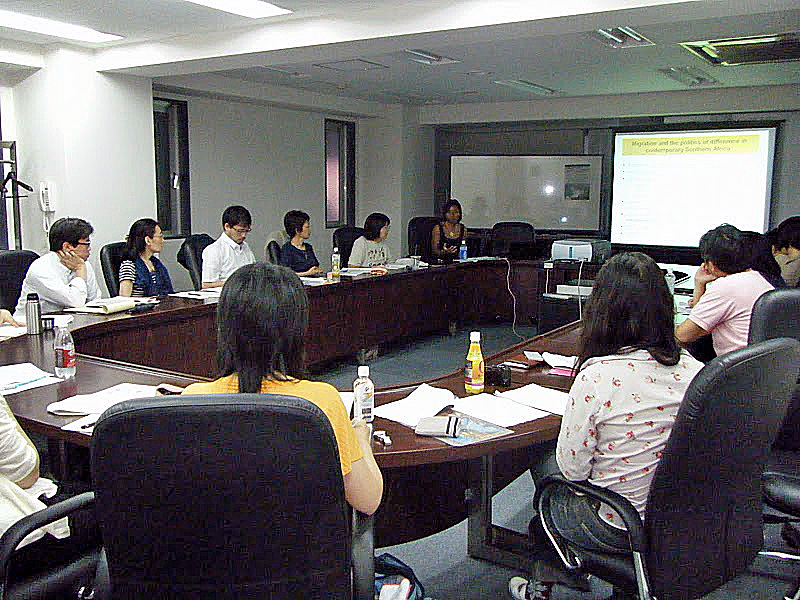第2回公開セミナー"Migration Regimes and the Politics of Difference in Contemporary Southern Africa"
講演者:
Scarlett Cornelissen 教授(ステレンボッシュ大学政治学科〈南アフリカ共和国〉)
日時: 2011年6月28日(火曜日) 18:00~20:00
場所: 東京外国語大学本郷サテライト7階会議室

"Migration Regimes and the Politics of Difference in Contemporary Southern Africa"
(現代南部アフリカにおける移民管理体制と差異の政治)
2011年度第2回公開セミナーでは、「虹の国」として知られる南アフリカ共和国の移民管理体制について、その政治経済的側面に注目されているScarlett Cornelissen 教授にご講演いただきました。会場には南アフリカ、および移民研究を専門とする関係者が集まり、南アフリカの政治経済や周辺国からの人の流入に伴うジェンダー・"人種"・南アフリカ人間の社会問題、他のアフリカ諸国と比較したときの政策面での特徴等について活発な議論が交わされました。
報告要旨
The issue of migration and in particular the increase in irregular or undocumented migration has become highly politicised in Southern Africa. This has involved a rise in social intolerance towards migrant populations and outright xenophobia in many countries. This brief article examines the dynamics and complexities of migration in current-day Southern Africa and contextualises it in relation to the most salient issues, discourses and practices that characterize migration governance at the international level. This presentation highlights that predominant approaches to the governance of migration in the region reflect some of the dynamics which have marked migration discourse and praxis in the international sphere, but that they also carry some distinct characteristics. Trends of securitisation and related exclusionary practices of citizenship, which have become more pronounced in the international sphere, are emulated in Southern Africa. State and societal processes and reactions to higher levels of regional migration have created a context in which social polarisation and the entrenchment of difference prevails. This has meant that prime questions about how to ameliorate the socio-economic and political circumstances which evoke migrant flows in the first instance, and on how to deal with the inefficiencies in Southern Africa's current migration policies, have remained largely unasked by the region's rulers. Overall, Southern Africa's migration regime evidences two contradictory thrusts, one which seeks to encourage closer regional and specifically economic integration, and the other which resists the assumed threats posed to national sovereignty by increased migrant flows and which leads to a fractious regional governance system.
*当報告の内容は、それぞれの著者の著作物です。Copyrighted materials of the authors.









